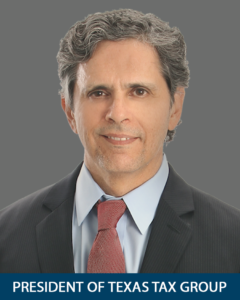
Dino Marcaccio
President
Former Texas Comptroller State Tax Auditor
Are auditors encouraged to over-assess tax?
I realize this is a provocative title. And I bet many of you are wondering HOW would I know what auditors think. After receiving my accounting degree from Texas A&M University, I went to work for the Texas Comptroller’s Office for 15 years and 10 months. While there, I became acquainted with over 100 auditors, supervisors and other employees during my tenure there.
Let me first say that I got to know many fine auditors who had the same attitude that I had, which was to see how little, if any, tax they could assess. We believed that our job was to HELP businesses understand the Sales/Use Tax laws of Texas. We also understood that many businesses, especially smaller ones, will not keep complete and accurate records and we as auditors should use reasonable and fair alternative audit methods to conduct the audits.
But part of the problem is that the agency maintains and provides to all auditors many tax assessment statistics which do nothing more than give a green light to aggressive auditing. These TAX STATS create a general idea among many auditors that if they are not assessing tax on at least 50% or more of your audits, then they are not doing their job. That’s right, approximately 50% of all Sales/Use Tax audits conducted by the Comptroller result in a TAX ASSESSMENT.
If auditors are not at least maintaining a 50% TAX DUE ratio, then many of them believe they will not get promoted. And if they don’t get promoted, then they don’t make money. You must understand that the primary way to get a raise at the agency is to get promoted from Auditor Level 1 through 5. As auditors get promoted from one auditor level to another, their pay significantly increases. Everyone knows that the general cost of living raises happen once every 7 or 8 years. Thus, promotions from one audit level to the next is the only realistic way to get a raise.
Some auditors even have TAX DUE percentages in the 60% to 75% range. In fact, a number of these auditors are promoted more than auditors with lower TAX DUE ratios. I am not making this up. I saw it happen over and over again and that is one of the main reasons I decided to QUIT the agency and start Texas Tax Group in 2007.
It always surprised me that these high tax due ratio auditors seemed to be treated more special at their respective audit offices. In most of the agency’s 23 audit offices, there is a fiscal year-end meeting. And at that meeting, the auditors who assess the most tax are often given special honors and attention. These meetings always bothered me. At one meeting an auditor by the name of Al Jimenez was given special recognition for only having two NO TAX DUE audits out of over 30 audits conducted. Other auditors who assessed over 1 million in tax due for the fiscal year were singled out for recognition.
If anyone reading this article does not believe me, then I would suggest they send an Open Records Request to the Texas Comptroller’s Office and ask for ALL auditor’s TAX STATISTICS REPORTS for the last 10 years. You may be shocked by what you see.
These TAX STAT REPORTS include, among other troubling data, the total tax assessments per audit and for various periods of time. What is really disturbing is that there is also a particular stat that most auditors refer to as the ‘batting average’ (i.e. dollars/hour). The batting average is the TAX DOLLARS ASSESSED PER HOUR for TAX DUE audits. Let me explain. Auditors must track all hours worked for each audit conducted. Then, for tax due audits, the agency divides the total tax due by the auditor’s hours worked to compute a tax-assessed per hour statistic. This ‘tax dollars per hour’ statistic is also computed for ALL tax due audits and is then used as a tool in evaluating auditors. I could go on and on about these auditor statistics reports, but I think you get the idea.
In my opinion, I also believe that there is a tendency for the agency to sometimes encourage (i.e., look the other way) auditors to attempt to over-assess tax. I will also say there are MANY auditors who DO NOT ever attempt to abuse the audit process to over-tax businesses. I have met many conscientious auditors whom I have become good friends with. But there are many other auditors who use alternative unfair audit methods to attempt to assess more tax than may be due.
You are probably wondering what ‘tricks’ can an auditor use to over-assess tax. Let me give you an example of just one of many that I have seen over the last 10 years while defending nearly 3,000 audits. In August of 2017 a CPA from Beaumont, Texas had a client who had been assessed over $140,000.00 in ‘bogus’ tax based on his IRS returns. How did it happen? The auditor simply applied Sales and/or Use Tax to 100% of the client’s asset and expense items per the IRS returns. The reason? The CPA could not reconcile all the summary IRS and financial statement asset and expense purchases to the final actual invoices. Unfair? Heck yes. Could the auditor do it legally? Heck yes. Were there other more reasonable audit methods? Of course there were, but neither the auditor nor the supervisor would budge. What happened? This audit was billed and the client had not yet decided whether to hire my firm to help. I gave the client a 50/50 chance at fixing this messy audit. In my opinion, I would estimate the business owners may have owed a fraction of this unreasonable assessment.
The point of this article is to WATCH OUT. You get ONE AUDIT. Be prepared. If you can afford it, hire a qualified Texas State Tax consulting firm that has an office in your city or surrounding area and is staffed by ex-Texas Comptroller auditors.
Best of luck,
Dino

